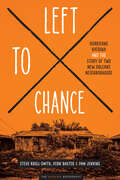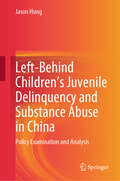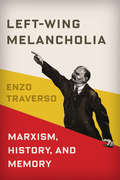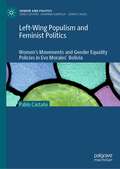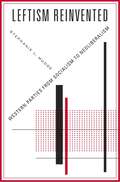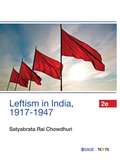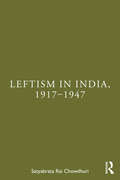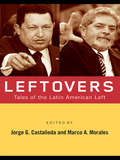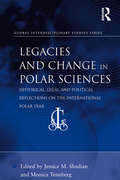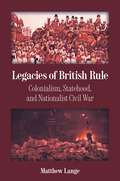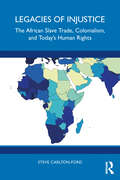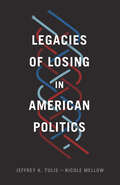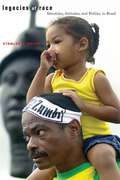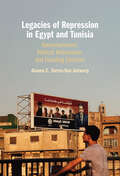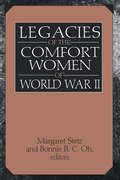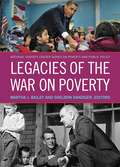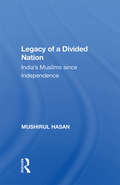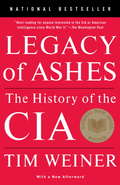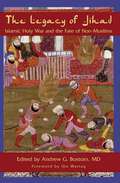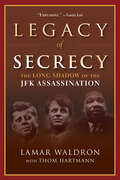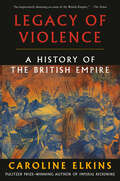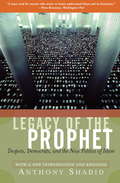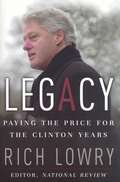- Table View
- List View
Left to Chance: Hurricane Katrina and the Story of Two New Orleans Neighborhoods (The Katrina)
by Steve Kroll-Smith Vern BaxterThis in-depth study of two black neighborhoods in the wake of Hurricane Katrina vividly captures the struggle and uncertainty in the process of rebuilding. Hurricane Katrina was the worst urban flood in American history, a disaster that destroyed nearly the entire physical landscape of a city, as well as the mental and emotional maps that people use to navigate their everyday lives. Left to Chance takes us into two African American neighborhoods—working-class Hollygrove and middle-class Pontchartrain Park—to learn how their residents have experienced &“Miss Katrina&” and the long road back to normal life. The authors spent several years gathering firsthand accounts of the flooding, the rushed evacuations that turned into weeks- and months-long exile, and the often confusing and exhausting process of rebuilding damaged homes in a city whose local government had all but failed. As the residents&’ stories make vividly clear, government and social science concepts such as &“disaster management,&” &“restoring normality,&” and &“recovery&” have little meaning for people whose worlds were washed away in the flood. For the neighbors in Hollygrove and Pontchartrain Park, life in the aftermath of Katrina has been a passage from all that was familiar and routine to an ominous world filled with existential uncertainty. Recovery and rebuilding become processes imbued with mysteries, accidental encounters, and hasty adaptations, while victories and defeats are left to chance.
Left-Behind Children’s Juvenile Delinquency and Substance Abuse in China: Policy Examination and Analysis
by Jason HungThis book constructs the theoretical framework based on a range of prominent social theories to address how juvenile delinquency is socioeconomically constructed. Here the presentation of conceptual details is supported by Chinese literature that rationalises, problematises, and analyses how left-behind children are vulnerable to premature smoking, heavy drinking and drug abuse and. I critically review all the most recent publications to highlight the most updated socioeconomic structure of juvenile delinquency experienced by Chinese left-behind children. In addition, the author summarises and analyses all the most up-to-date policy recommendations and evaluations concerning the mitigation of left-behind children’s juvenile delinquency. The policymaking outputs help inform readers on how Chinese policymakers have specifically been endeavouring to intervene in left-behind children’s delinquent behaviours and what policy directions the corresponding policymakers are trending towards in the future.
Left-Wing Melancholia: Marxism, History, and Memory (New Directions in Critical Theory #17)
by Enzo TraversoThe fall of the Berlin Wall marked the end of the Cold War but also the rise of a melancholic vision of history as a series of losses. For the political left, the cause lost was communism, and this trauma determined how leftists wrote the next chapter in their political struggle and how they have thought about their past since. Throughout the twentieth century, argues Left-Wing Melancholia, from classical Marxism to psychoanalysis to the advent of critical theory, a culture of defeat and its emotional overlay of melancholy have characterized the leftist understanding of the political in history and in theoretical critique.Drawing on a vast and diverse archive in theory, testimony, and image and on such thinkers as Karl Marx, Walter Benjamin, Theodor W. Adorno, and others, the intellectual historian Enzo Traverso explores the varying nature of left melancholy as it has manifested in a feeling of guilt for not sufficiently challenging authority, in a fear of surrendering in disarray and resignation, in mourning the human costs of the past, and in a sense of failure for not realizing utopian aspirations. Yet hidden within this melancholic tradition are the resources for a renewed challenge to prevailing regimes of historicity, a passion that has the power to reignite the dialectic of revolutionary thought.
Left-Wing Populism and Feminist Politics: Women’s Movements and Gender Equality Policies in Evo Morales’ Bolivia (Gender and Politics)
by Pablo CastañoThis book investigates the relation between left-wing populism and feminist politics by analysing three specific aspects. First, whether left-wing populist parties promote gender equality policies, against charges of a general inconsistency between both political projects; Second, how do these parties form their policy-making coalitions in the field of gender equality; Third, how much impact on policy do women’s movements have when left-wing populists are in power. The book is focused on the case of Bolivia during the first twelve years of Evo Morales's presidency. The empirical analysis is based on the qualitative content analysis of documents and semi-structured interviews with women’s movements’ activists, policy-makers and experts in women’s movements. The central issue of the book is present throughout the volume, but each empirical chapter can be also read as a semi-autonomous analysis of a specific aspect of the relation between left-wing populism and feminist politics, which increases the interest of the book for different audiences including experts in gender and politics and feminist activists, specialists in Latin American politics, indigenous politics and social movements.
Leftism Reinvented: Western Parties from Socialism to Neoliberalism
by Stephanie L. MudgeLeft-leaning political parties play an important role as representatives of the poor and disempowered. They once did so by promising protections from the forces of capital and the market’s tendencies to produce inequality. But in the 1990s they gave up on protection, asking voters to adapt to a market-driven world. Meanwhile, new, extreme parties began to promise economic protections of their own—albeit in an angry, anti-immigrant tone. To better understand today’s strange new political world, Stephanie L. Mudge’s Leftism Reinvented analyzes the history of the Swedish and German Social Democrats, the British Labour Party, and the American Democratic Party. Breaking with an assumption that parties simply respond to forces beyond their control, Mudge argues that left parties’ changing promises expressed the worldviews of different kinds of experts. To understand how left parties speak, we have to understand the people who speak for them. Leftism Reinvented shows how Keynesian economists came to speak for left parties by the early 1960s. These economists saw their task in terms of discretionary, politically-sensitive economic management. But in the 1980s a new kind of economist, who viewed the advancement of markets as left parties’ main task, came to the fore. Meanwhile, as voters’ loyalties to left parties waned, professional strategists were called upon to “spin” party messages. Ultimately, left parties undermined themselves, leaving a representative vacuum in their wake. Leftism Reinvented raises new questions about the roles and responsibilities of left parties—and their experts—in politics today.
Leftism in India, 1917–1947
by Chowdhuri, Late Satyabrata RaiThis book provides a comprehensive account of the Leftist movements in India during the most decisive phase of its struggle for freedom. It also describes how the Leftist movements interacted with the mainstream Indian freedom movement led by the Indian National Congress, guided by Mohandas Karamchand Gandhi and his ideology of non-violence. This ideology directly opposed those who believed in Marxism - Leninism and, naturally, their policies clashed at almost every stage of the freedom movement. These clashes gave rise to dramatic developments, which have been described in this book in their proper context and analysed with scholarly objectivity. The book traces the early twentieth century socio-political awakening of the bourgeois-democratic class of Indian society, the rise of Left-wing nationalists following the Swadeshi Movement, the activities of the early revolutionaries and the formation of the Communist Party of India abroad, the growth of communism in India, the growth of the Left wing within the Indian National Congress (known as the Congress socialists) and various labour and peasant movements. Leftism in India, 1917 - 1947 is an essential reading for students of history and political science, civil services aspirants and for anyone wishing to gain a thorough understanding of the origin of and the early practices of the Left in India.
Leftism in India, 1917–1947
by Satyabrata Rai ChowdhuriThis book provides a comprehensive account of the Leftist movements in India during the most decisive phase of its struggle for freedom. It also describes how the Leftist movements interacted with the mainstream Indian freedom movement led by the Indian National Congress, guided by Mohandas Karamchand Gandhi and his ideology of non-violence. This ideology directly opposed those who believed in Marxism-Leninism and, naturally, their policies clashed at almost every stage of the freedom movement. These clashes gave rise to dramatic developments, which have been described in this book in their proper context and analysed with scholarly objectivity.The book traces the early twentieth-century socio-political awakening of the bourgeois-democratic class of Indian society, the rise of Left-wing nationalists following the Swadeshi Movement, the activities of the early revolutionaries and the formation of the Communist Party of India abroad, the growth of communism in India, the growth of the Left wing within the Indian National Congress (known as the Congress socialists) and other Left parties, and various labour and peasant movements.The book will be useful to the students, researchers and teachers of Political Science, History and South Asian Studies. Readers with an interest in South Asian politics and anyone wishing to gain a thorough understanding of the origin of the Left in India will also find the book interesting.
Leftist Governments in Latin America
by Kurt Weyland Wendy Hunter Raúl L. Madrid Kurt Weyland Raúl L. MadridCan Latin America s new left stimulate economic development, enhance social equity, and deepen democracy in spite of the economic and political constraints it faces? This is the first book to systematically examine the policies and performance of the left-wing governments that have risen to power in Latin America during the last decade. Featuring thorough studies of Bolivia, Brazil, Chile, and Venezuela by renowned experts, the volume argues that moderate leftist governments have attained greater, more sustainable success than their more radical, contestatory counterparts. Moderate governments in Brazil and Chile have generated solid economic growth, reduced poverty and inequality, and created innovative and fiscally sound social programs, while respecting the fundamental principles of market economics and liberal democracy. By contrast, more radical governments, exemplified by Hugo Chavez in Venezuela, have expanded state intervention and popular participation and attained some short-term economic and social successes. "
Leftovers: Tales of the Latin American Left
by Jorge G. Castañeda Marco A. MoralesOver a decade ago, Jorge Castañeda wrote the classic Utopia Unarmed, which offered a penetrating and comprehensive account of the Latin American left’s fate at the end of the Cold War. Since then, the left across Latin America has travelled in paths no one could have predicted. Latin American nations from Mexico to Argentina wavered for years between leftism and American-supported neoliberalism, but in recent years the left has experienced a tremendous resurgence throughout the region. However, the left is not unified, and as Castañeda, Morales, and their contributors show, it has followed two distinct paths – a more cosmopolitan style leftism, exemplified by Brazil and Chile, and a left fuelled by populist nationalism that has clear debts to Perón or Cárdenas, and is most evident in Venezuela, Mexico’s PRD, Bolivia, and Argentina. Leftovers comprehensively updates this very important story, with country and area specialists contributing.
Legacies and Change in Polar Sciences: Historical, Legal and Political Reflections on The International Polar Year (Global Interdisciplinary Studies Series)
by Monica Tennberg Jessica M. ShadianProviding case study analyses of the politics of science in and around the International Polar Year of 2007-2008, this volume makes a distinct contribution to ongoing research focusing on the relationship between science, international politics, law and history. The contributors combine both interdisciplinary and multi-theoretical approaches to engage directly with the most recent debates in international relations scholarship, to include discussions of arctic climate change, governance issues, reflections on the Antarctic Treaty and the science-geopolitics interface amongst others. This is the first comprehensive account to look explicitly at the relationship between global politics and science through an account of the International Polar Years.
Legacies of British Rule: Colonialism, Statehood, and Nationalist Civil War (Princeton Studies in Global and Comparative Sociology)
by Matthew LangeThe relationship between colonial pluralism and nationalist civil war in former British coloniesWhy do some communities fight civil wars over national self-rule while others do not? In Legacies of British Rule, Matthew Lange offers insight into this question through a rigorous multimethod and comparative analysis that pinpoints the combined impact of precolonial statehood and British colonialism. During transitions from empire to nation-state, postcolonial officials in places with large and long-standing precolonial states commonly try to build a unified nation around the dominant community in ways that discriminate against and exclude smaller communities. While such national chauvinism can fuel reactions leading to nationalist civil war, a history of British colonialism intensifies these reactions by increasing sensitivity to national chauvinism and empowering communities to act. Consequently, nationalist civil wars are three times more common in former British colonies than in other former overseas colonies.And yet, Lange finds that British colonialism exerts a very different effect on places with a limited history of precolonial statehood; in an environment with little national chauvinism, British colonialism deters nationalist civil war by promoting more inclusive postcolonial states that strengthen plurinationalism and limit fear and anger over reduced communal autonomy. Lange&’s account provides valuable new insights into the roots of nationalist civil war, broad patterns of conflict, and the mixed effects of colonialism and pluralism.
Legacies of Empire
by Sandra Halperin Ronen Palan Halperin, Sandra and Palan, RonenThe nation-state is a fairly recent historical phenomenon. Human history over the past two to four millennia has been dominated by empires, and the legacies of these empires continues to shape the contemporary world in ways that are not always recognised or fully understood. Much research and writing about European colonial empires has focused on relations between them and their colonies. This book examines the phenomenon of empire from a different perspective. It explores the imprint that imperial institutions, organisational principles, practices, and logics have left on the modern world. It shows that many features of the contemporary world - modern armies, multiculturalism, globalised finance, modern city-states, the United Nations - have been profoundly shaped by past empires. It also applies insights about the impact of past empires to contemporary politics and considers the long-term institutional legacies of the American 'empire'.
Legacies of Injustice: The African Slave Trade, Colonialism, and Today’s Human Rights
by Steve Carlton-FordThis book examines the impact of the African slave trade and colonialism on political, civil, economic, social, and environmental human rights. Using multiple combined data sets, the book demonstrates that many contemporary human rights issues stem from the impact of the African slave trade and subsequent colonialism as well as the disruption of economic and political development in colonies.Unlike other books concerning human rights, this book views contemporary human rights issues from both historical and sociological vantage points. This important book will be of interest to students studying in courses covering human rights, Africa and Africana studies and history, comparative ethnic studies, historical sociology, and global studies of the African slave trade.
Legacies of Losing in American Politics (Chicago Studies in American Politics)
by Jeffrey K. Tulis Nicole MellowAmerican politics is typically a story about winners. The fading away of defeated politicians and political movements is a feature of American politics that ensures political stability and a peaceful transition of power. But American history has also been built on defeated candidates, failed presidents, and social movements that at pivotal moments did not dissipate as expected but instead persisted and eventually achieved success for the loser’s ideas and preferred policies. With Legacies of Losing in American Politics, Jeffrey K. Tulis and Nicole Mellow rethink three pivotal moments in American political history: the founding, when anti-Federalists failed to stop the ratification of the Constitution; the aftermath of the Civil War, when President Andrew Johnson’s plan for restoring the South to the Union was defeated; and the 1964 presidential campaign, when Barry Goldwater’s challenge to the New Deal order was soundly defeated by Lyndon B. Johnson. In each of these cases, the very mechanisms that caused the initial failures facilitated their eventual success. After the dust of the immediate political defeat settled, these seemingly discredited ideas and programs disrupted political convention by prevailing, often subverting, and occasionally enhancing constitutional fidelity. Tulis and Mellow present a nuanced story of winning and losing and offer a new understanding of American political development as the interweaving of opposing ideas.
Legacies of Race: Identities, Attitudes, and Politics in Brazil
by Stanley R. BaileyMost of our understanding of Brazilian racial attitudes, according to Bailey (sociology, U. of California at Irvine), come either from studies of elite attitudes or from localized ethnographies, leaving us with little understanding of the racial attitudes of the Brazilian masses. He fills the gap in the literature by analyzing the "racial common sense" captured in three major surveys of racial attitudes: the 1995 DataFolha national sample survey of racial attitudes, the 2000 CEAP/DataUff survey of racial attitudes in the state of Rio de Janeiro, and the 2002 PESB national social survey. He also provides comparative context concerning the changing nature of racial attitudes in the United States. Annotation ©2009 Book News, Inc., Portland, OR (booknews.com)
Legacies of Repression in Egypt and Tunisia: Authoritarianism, Political Mobilization, and Founding Elections
by Alanna C. Torres-Van AntwerpWhen an authoritarian regime collapses, what determines whether an opposition group will form a political party, be successful in mobilizing voters, and survive or dissolve as a group in subsequent years? Based on unique field research, Alanna C. Torres-Van Antwerp examines the origins of the dramatic political arc of Egypt's Muslim Brotherhood - from winning a plurality of parliamentary seats and the presidency in the first free elections in eighty years to being ousted from office eighteen months later through a popular coup - and finds common causal factors that structured the fates of other formerly repressed opposition groups in five comparative cases. She demonstrates how the processes of party formation, electoral mobilization, and party dissolution after the ousting of an authoritarian regime were shaped by the way that regime structured the resources, incentives, and constraints available to opposition groups in the previous era.
Legacies of the Comfort Women of World War II
by Margaret D. Stetz Bonnie B. OhThe stories of the former comfort women have galvanized both Asian and non-Asian intellectuals working in a variety of fields. Scholars of Asian history and politics, feminists, human rights activists, documentary filmmakers, visual artists, and novelists have begun to address the subject of the comfort system; to take up the cause of the surviving comfort women's sturggles; to call attention to sexual violence against women, especially during wartime; to consider the links among militarism, racism, imperialism, and sexism; and to include this history into 20th-century political history. This volume contains a cross-section of responses to the issues raised by the former comfort women and their new visibility on the international stage. Its focus is on how theorists, historians, researchers, activists, and artists have been preserving, interpreting, and disseminating the legacies of the comfort women and also drawing lessons from these. The essays consider the impact and influence of the comfort women's stories on a wide variety of fields and describe how those stories are now being heard or read and used in Asian and in the West.
Legacies of the War on Poverty
by Martha J. Bailey Sheldon DanzingerMany believe that the War on Poverty, launched by President Johnson in 1964, ended in failure. In 2010, the official poverty rate was 15 percent, almost as high as when the War on Poverty was declared. Historical and contemporary accounts often portray the War on Poverty as a costly experiment that created doubts about the ability of public policies to address complex social problems. Legacies of the War on Poverty, drawing from fifty years of empirical evidence, documents that this popular view is too negative. The volume offers a balanced assessment of the War on Poverty that highlights some remarkable policy successes and promises to shift the national conversation on poverty in America. Featuring contributions from leading poverty researchers, Legacies of the War on Poverty demonstrates that poverty and racial discrimination would likely have been much greater today if the War on Poverty had not been launched. Chloe Gibbs, Jens Ludwig, and Douglas Miller dispel the notion that the Head Start education program does not work. While its impact on children's test scores fade, the program contributes to participants' long-term educational achievement and, importantly, their earnings growth later in life. Elizabeth Cascio and Sarah Reber show that Title I legislation reduced the school funding gap between poorer and richer states and prompted Southern school districts to desegregate, increasing educational opportunity for African Americans. The volume also examines the significant consequences of income support, housing, and health care programs. Jane Waldfogel shows that without the era's expansion of food stamps and other nutrition programs, the child poverty rate in 2010 would have been three percentage points higher. Kathleen McGarry examines the policies that contributed to a great success of the War on Poverty: the rapid decline in elderly poverty, which fell from 35 percent in 1959 to below 10 percent in 2010. Barbara Wolfe concludes that Medicaid and Community Health Centers contributed to large reductions in infant mortality and increased life expectancy. Katherine Swartz finds that Medicare and Medicaid increased access to health care among the elderly and reduced the risk that they could not afford care or that obtaining it would bankrupt them and their families. Legacies of the War on Poverty demonstrates that well-designed government programs can reduce poverty, racial discrimination, and material hardships. This insightful volume refutes pessimism about the effects of social policies and provides new lessons about what more can be done to improve the lives of the poor.
Legacy Of A Divided Nation: India's Muslims From Independence To Ayodhya
by Mushirul HasanThis book is regarded as a personal manifesto, a statement through the history of partition and its aftermath, of the values which India's Muslims should cherish and of the national priorities they should promote. It provides the reference-point for understanding India's Partition and its legacy.
Legacy of Ashes: The History of the CIA
by Tim WeinerWith shocking revelations that made headlines in papers across the country, Pulitzer-Prize-winner Tim Weiner gets at the truth behind the CIA and uncovers here why nearly every CIA Director has left the agency in worse shape than when he found it; and how these profound failures jeopardize our national security.
Legacy of Jihad: Islamic Holy War and the Fate of Non-Muslims
by Andrew G. BostomThis book reveals how, for well over a millennium and across three continents - Asia, Africa, and Europe - non-Muslims who were vanquished by jihad wars became forced tributaries (called dhimmi in Arabic) in lieu of being slain. Under the dhimmi religious caste system, non-Muslims were subjected to legal and financial oppression, as well as social isolation. Extensive primary and secondary source materials, many translated here for the first time into English, are presented, making clear that jihad conquests were brutal, imperialist advances, which spurred waves of Muslims to expropriate a vast expanse of lands and subdue millions of indigenous peoples. Finally, the book examines how jihad war, as a permanent and uniquely Islamic institution, ultimately regulates the relations of Muslims with non-Muslims to this day. Scholars, educators, and interested lay readers will find this collection an invaluable resource.
Legacy of Secrecy: The Long Shadow of the JFK Assassination (Playaway Adult Nonfiction Ser.)
by Thom Hartmann Lamar WaldronJohn F. Kennedy's assassination launched a frantic search to find his killers. It also launched a flurry of covert actions by Lyndon Johnson, Robert F. Kennedy, and other top officials to hide the fact that in November 1963 the United States was on the brink of invading Cuba, as part of a JFK-authorized coup. The coup plan's exposure could have led to a nuclear confrontation with Russia, but the cover-up prevented a full investigation into Kennedy's assassination, a legacy of secrecy that would impact American politics and foreign policy for the next 45 years. It also allowed two men who confessed their roles in JFK's murder to be involved in the assassination of Dr. Martin Luther King, in 1968. Exclusive interviews and newly declassified files from the National Archives document in chilling detail how three mob bosses were able to prevent the truth from coming to light - until now.
Legacy of Violence: A History of the British Empire
by Caroline ElkinsFrom a Pulitzer Prize–winning historian: a searing study of the British Empire that probes the country's pervasive use of violence throughout the twentieth century and traces how these practices were exported, modified, and institutionalized in colonies around the globeSprawling across a quarter of the world's land mass and claiming nearly seven hundred million people, Britain's twentieth-century empire was the largest empire in human history. For many Britons, it epitomized their nation's cultural superiority. But what legacy did the island nation deliver to the world? Covering more than two hundred years of history, Caroline Elkins reveals an evolutionary and racialized doctrine that espoused an unrelenting deployment of violence to secure and preserve the nation's imperial interests. She outlines how ideological foundations of violence were rooted in the Victorian era calls for punishing recalcitrant "natives," and how over time, its forms became increasingly systematized. And she makes clear that when Britain could no longer maintain control over the violence it provoked and enacted, it retreated from empire, destroying and hiding incriminating evidence of its policies and practices.Drawing on more than a decade of research on four continents, Legacy of Violence implicates all sides of Britain's political divide in the creation, execution, and cover-up of imperial violence. By demonstrating how and why violence was the most salient factor underwriting Britain's empire and the nation's imperial identity at home, Elkins upends long-held myths and sheds new light on empire's role in shaping the world today.
Legacy of the Prophet: Despots, Democrats, and the New Politics of Islam
by Anthony ShadidNow available in paperback, Legacy of the Prophetis a sweeping, first-person account of the transformation in the style and message of Islamic politics at the beginning of the twenty-first century. As terrorism floods our headlines, this book offers a rare but much-needed counterpoint: it shows that Islamic activists have increasingly renounced violence in order to form political parties, engage in grass-roots work, and enter into civil society to bring about peaceful reform in their authoritarian societies. Drawing on his years of reporting in more than a dozen countries of the Muslim world, Anthony Shadid charts the way in which the adolescence of yesterday’s Islamic militants is yielding to the maturity of today’s activists. Through personal interviews and extensive travel, he chronicles that new generation, which is finding a more realistic and potentially more successful future through democratic politics. Complete with a new introduction, Legacy of the Prophetpromises to redefine the debate over the future of political Islam.
Legacy: Paying The Price For The Clinton Years
by Richard LowryRichard Lowry explores the real importance of the Clinton years--the Clinton administration appeasing and ignoring the ever-growing threats to American security from hostile regimes and parties, rogue states, and global terrorist networks. Lowry offers the first sweeping-and stunning assessment of what the Clinton era really meant and means for America.
